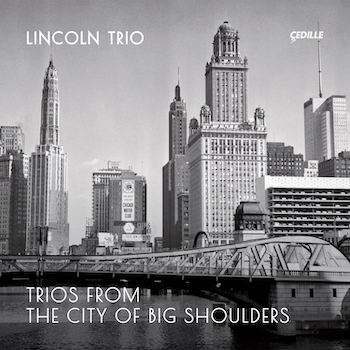Classical Album Review: Lincoln Trio’s Splendid “Trios from the City of Big Shoulders”
By Jonathan Blumhofer
One of the year’s standout releases: full of wonderful music, all of it well worth getting to know, and played to the hilt.

There’s no shortage of technical or expressive excellence to be found in the Lincoln Trio’s new album, Trios from the City of Big Shoulders. Currently the artists-in-residence at Chicago’s Merit School of Music, the group celebrates two composers with ties to that city.
Ernst Bacon was born and spent his formative years there, though his career mostly unfolded on the East and West Coasts. He was a prolific composer, writing for ensembles large and small; at the heart of his output is a collection of over 200 songs.
Bacon’s Trio no. 2 draws on some of those, as well as various kinds of American music, including marches, folk songs, and jazz. Written in 1987, three years before his death at 91, it’s music of real assurance and substance, evincing brilliant technical skill but also much character and heart.
Remarkably, the Lincoln Trio’s is the piece’s premiere recording. Inexplicable though that fact may be, their performance is worth the wait.
There are six movements. The first is divided into two sections. The opening part recalls Bartók a bit: it’s lyrical and chromatic and builds to a lovely apotheosis. Then follows part two, essentially a folksy march that becomes menacing as it proceeds. The second movement, “In an easy walk,” begins simply but grows in soulfulness and expressive density.
Songfulness reigns in the radiant third movement, while the jazzy fourth is marked by playful, spunky figures and a welcome, swaggering insouciance. The short fifth is graceful if enigmatic and the finale builds from folk-song-like exchanges between violin and cello at the beginning to a stormy, driving coda.
The Lincoln Trio has the full measure of this music, playing with passion and brio. Indeed, that such electricity comes across on disc is as much a tribute to the trio’s total identification with the music at hand as it is to Cedille’s resonant documentation of the performance. Suffice it to say, one could hardly ask for stronger advocacy for this piece than what’s given here.
Much the same can be said for the Lincoln’s account of Leo Sowerby’s 1953 Trio.
Sowerby’s life was, in some regards, the inverse of Bacon’s: born in Michigan, Sowerby settled in Chicago, where he was a longtime faculty member at the American Conservatory.
Expressively, his Trio is a bit darker and more subdued than Bacon’s. But it is equally well crafted and doesn’t once lack for personality.
Cast in a more conventional three-movement form, Sowerby’s writing alludes to some of his contemporaries — the intensity of the first movement’s dark, searching, fugal opening, for instance, doesn’t feel too far removed from Shostakovich — but it never descends into parody or mimicry.
Quite the opposite: there’s a sense of constant transformation of materials throughout the big first movement. The second provides a delicate, gorgeous contrast: the opening piano melody is an absolute gem. Meanwhile, the finale alternates turbulent, vigorous figures with a more martial idea; the two types of music are worked out until they’re swept up in a grand, exhilarating coda.
Pianist Marta Aznavoorian has, perhaps, the most immense task in this piece: Sowerby’s keyboard writing never seems to be at a loss for something to do. Yet she focuses every gesture purposefully. Together, Aznavoorian, violinist Desirée Ruhstrat, and cellist David Cunliffe bring a rigorous attention to balances and dynamics to their reading. Tempos are wisely judged. As a result, this is, at once, some well-shaped and gripping Sowerby.
As in the Bacon, Cedille’s engineering team captures the event palpably. Also worth special citation are Elinor Olin’s superbly informative liner notes on both composers and works.
In short, this is one of the year’s standout releases: full of wonderful music, all of it well worth getting to know, and played to the hilt.
Jonathan Blumhofer is a composer and violist who has been active in the greater Boston area since 2004. His music has received numerous awards and been performed by various ensembles, including the American Composers Orchestra, Kiev Philharmonic, Camerata Chicago, Xanthos Ensemble, and Juventas New Music Group. Since receiving his doctorate from Boston University in 2010, Jon has taught at Clark University, Worcester Polytechnic Institute, and online for the University of Phoenix, in addition to writing music criticism for the Worcester Telegram & Gazette.
